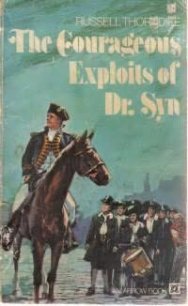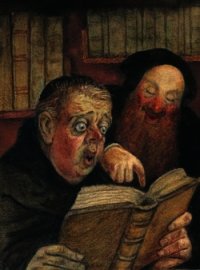Doctor Syn on the High Seas - Thorndike Russell (читать лучшие читаемые книги TXT) 📗
my dear, unless you prefer to wait upon yourself, you will permit my
clumsy fingers to act the lady’s -maid. That tempting little bodice must
be unhooked. Yes. Now.”
The wine mounted to his brain as he lurched toward her.
“Have pity!” she pleaded.
“It is you who are cruel,” he said. “Your beauty tortures me. Must I
take you without consent? It will be worse for your mother if I do.
Come here, you ravishing devil, and let me kiss you down to Hell.”
“What are you bound for now.”
These words were rapped out in a cold voice behind him.
The Squire, who had seized the girl in his strong embrace, swung
around, as what he saw drained the blood from his heated cheeks. He
stood there swaying, ashen pale, with terror in his eyes. He seemed
incapable of movement, but just stared at the two cloaked figures who
were standing there with drawn swords.
For the moment Imogene could not believe her sight. She had
forgotten the secret panel. The mysterious appearance of her lover and
his friend to her was something of the supernatural. Doctor Syn saw
that the Squire was equally mystified, and calmly he set him right.
“We are no ghosts, my Bully”, he said icily. “Indeed, you will find
us very flesh and blood. You have insulted us both. You will fight us
both, though something tells me there will be no need for Mr. Cobtree to
engage you. You are a bully, a coward, a liar and a cheat. And you
will fight now, and in this room, which you have so carefully left
undisturbed till dawn.”
With an effort the Squire seemed to shake his huge body into some
confidence. He knew at least that he was a match for most in a duel.
“May I ask,” he said coldly, “the name of the servant who has
betrayed my secret panel to you, parson? For after I have dealt with
you, with both of you, I shall deal with him. I pay good wages for
services, but only death for betrayal.”
“It is not your servants, but your sins, that have betrayed you,”
went on Doctor Syn. “I wonder now if you recollect among your victims a
certain lovely girl called Esther Sommers. Ah; I see you do. She died
of the shame she suffered at your hands. Since God is shortly to judge
you for that, I will not dwell on that girl’s tragedy. But I wish to
point out your own
- 38 -
stupidity. You did not know that Charles Herman was her uncle, did you?”
“And who the hell is he?” demanded the Squire.
“The cabinet-maker and locksmith who repaired this panel behind me,”
explained Syn. “You were very stupid not to see that he destroyed the
mold from which he made the key to the water -gate. From it he made
another key, and gave it to the father of Esther Sommers. We have made
good use of that key tonight. You see, there comes a time when the most
evil man an mock God no more.”
“Don’t preach, but fight!” cried the Squire.
“I shall be at your service in a moment, sir” replied Syn. He
turned to Imogene, who had been so overcome with grief that she
had been unable to move. “My beloved, thank God, Who guided us
here to rescue you in time.”
As she flung herself sobbing into his arms, the Squire took
three swift strides towards a cabinet on which lay his case of
pistols. But Tony Cobtree was there first, with his sword at
the other’s breast.
“Take your hand from that box, sir” he cried, “or by God I’ll
spit you like an ox! Get back!”
“I was merely preparing for the fight, sir. You may examine
the pistols if you wish.
“We fight with steel,” said Syn finally. He then turned
again to Imogene and added, “Do you know where your mother is,
so that we may relieve her of anxiety?”
“Yes,” replied Imogene. “Let us go to her at once. And
then, Christopher, let us go and leave this devil. Let us leave
him to the law to deal with. Why should you risk your life?”
“Because I believe that God has appointed me to kill him.”
He then looked at this friend and added, “Tony, do you take
Imogene to her mother, for I have my duty here, which will be no
sight for ladies.”
Tony shook his head. “I am sorry, old friend. But, knowing
the man’s reputation, I feel obligated too stay here and see
fair fight.”
“This is my home, gentlemen,” cried the Squire. “And I’ll
brook your insults no longer. Let us either hear the clash of
steel or the crack of artillery, and be done with it. Then I
shall be at liberty to enjoy the fresh beauty of this ravisher.”
In two strides Syn was at him, and with all his strength he
smote him on his unhealed wound upon the jaw, cutting it open
till the blood fell in a red cascade upon his cravat.
“I’ll kill you for this!” hissed the Squire.
- 39 -
“I ask nothing better than that you should try,” replied the parson.
There was no question of Imogene’s mother then, for the Squire
unhooked two dueling -swords from above the fireplace and placed them,
hilts from him, on the gaming table.
“Choose!” he cried.
“I choose my own sword to kill you with,” replied the parson. “It
was returned to me by a man of Romney Marsh who took it from my father’s
dead hand at Culloden Field. Your own blade may be the longer, for all
I care, but I fight you with my father’s sword. Are you afra id at last?
It is the first time you have met a better man?”
Now, for his father’s sword Syn had a great affection. As a matter
of sentiment he had not only kept it clean and sharp, but he had trained
his hand to use it as his father’s son, and despite his cloth of peace
he had taken it daily to the fencing -school for exercise. Thus it was
that the Squire of Iffley was unpleasantly surprised when, having
selected a weapon to match his opponent’s, he found a blade opposing him
that proved a brain within its temper.
It may have been a full minute that the blades slithered and clanked,
but in that minute the Squire knew that he would have to use his utmost
skill and be aided by fortune in order to break down the other’s guard.
He therefore called a halt by crying out:
“A moment, Mister Parson. If we are fighting to the death and in my
house, I would wish that all things were fair. I see you know something
of fence. Well, as sportsmen let us enjoy the other’s skill before one
of us shall fall. Suppos e we both remove our coats and vests, roll up
our sleeves, drink our last drink, maybe, and fall to it again?”
“As you wish, sir,” replied the parson, and then to Imogene, “We
shall not keep your dear mother long in suspense. In a few minutes she
will be avenged.”
Meanwhile Cobtree had taken advantage of the break to better the
dueling space. He pulled aside the big gaming-table, and placed the
movable candelabras facing one another in the centre of the room. This,
with the help of the hanging chandeliers, concentrated the light into
the centre of the oak floor. He then rolled aside the heavy rugs, and
was about to move the wine-table when the Squire interrupted.
“We will drink before we fight,” he said. “Although there is nothing
but hate between us, I will at least offer you that much hospitality. I
would see no one bound for hell or heaven lacking a drink.”
“For us, sir, no,” replied Syn, who had already stripped himself of
coat and vest and clerical cravat, and rolled up his shirtsleeves. “Mr.
Cobtree and myself are only in the habit of drinking with gentlemen.
From your appearance you have drunk already more than is good for you
safety, and if you will permit me to preach one more to your advantage,




